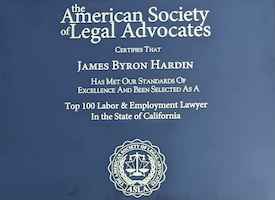How Does Contract Law Affect Your Employment Law Claim?
Occasionally, contract law can affect an employment law claim. Contract law issues can arise when an arbitration agreement governs an employment dispute. When an employer seeks to enforce an arbitration agreement, an employee may argue they did not validly agree (i.e., assent) to the contract, or that the contract itself is so unconscionable that the court should refuse to enforce it. A recent California appellate decision illustrates how California courts apply principles of contract law to employee arbitration agreements.
The Facts
According to the facts discussed in the opinion, the employees worked at an In-N-Out Burgers (INO) meat processing facility. The employees filed a complaint against INO alleging sex and national origin discrimination, sexual harassment, and a hostile work environment, among other claims. In response, INO filed a motion to compel arbitration, noting that the employees electronically signed INO’s agreement to arbitrate through an online training module. INO further argued that employees failed to exercise their right to opt out of the agreement within 30 days of receipt. Employees filed their opposition to the motion. One employee claimed she did not see the agreement until after she filed the lawsuit, concluding that her electronic signature was forged. In support of this theory, she noted that English was not her primary language, and she did not know how to use a computer. The other employee claimed that he signed the agreement because his supervisor threatened him by advising him to “get a lawyer” if he refused. In response, INO attacked both employees’ credibility. The trial court granted INO’s motion to compel arbitration, and the arbitrator found in favor of INO.
The Appeal
On appeal, the employees argued that INO failed to prove the first employee assented (i.e., expressed agreement) to the arbitration agreements; both plaintiffs validly opted out of the agreement; and the agreement was unconscionable. The appeals court rejected these arguments. First, the appeals court affirmed the court’s finding that the first employee agreed to the agreement. The court rejected the employee’s contention that someone else must have signed the agreement without her consent. Most notably, the appeals court credited INO’s electronic records showing that the employee electronically signed the agreement by entering her unique employee identification number and PIN. Because the PINs were completely confidential, no one could have signed the agreement except the employee. In light of several employees’ declarations that no one else logged into this employee’s computer, the trial court was entitled to credit those declarations over the employee’s claim.
Next, the appeals court found that the employees did not timely opt out of the agreement to arbitrate. The employees attempted to argue that they could opt out within 30 days of receiving employment records from their attorneys. However, the plain language of the agreement required them to opt out within 30 days of receiving and signing the agreement. Because they did not opt out within the requisite time period, the agreement applied to their dispute. Finally, despite finding some procedural unconscionability, the court held that the agreement was enforceable.
Contract Law and Employment Claims
Under contract law, an agreement has procedural unconscionability if the circumstances of contract negotiation and formation have resulted from unequal bargaining power. It also requires oppression or surprise. Here, the most prominent procedurally unconscionable element included INO requiring employees to sign the agreement in order to complete their training module. To opt out, employees had to go through multiple additional steps. While some aspects of the agreement were somewhat oppressive, the procedural unconscionability was not so great as to invalidate the agreement. Therefore, because the agreement was enforceable, the appeals court affirmed the decision in favor of INO.
If you have questions about how an arbitration agreement will affect your case, contact the Hardin Law Group to speak with a California employment law attorney





















